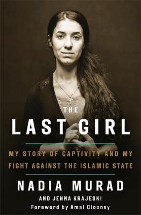The last girl by Nadia Murad and Jenna Krajeski

Virago, 2017. ISBN 9780349009759
(Age: Senior secondary - Adult) Highly recommended. The Yazidi
people are a religious minority group living primarily in a northern
province of Iraq. Because they worship a fallen angel, Melek Taus,
the peacock angel, they have been branded devil worshippers by the
Islamic State of Iraq and Syris (ISIS) who have selected verses of
the Qur'an to justify treating the Yazidi as property not humans.
Thus Yazidi may be traded as slaves or killed without any qualm of
conscience.
Nadia Murad, a Yazidi, born and raised in the small village of
Kocho, Iraq, has documented how ISIS lay siege to their village,
killed the men and elderly women, took the young men for
brainwashing as soldiers and suicide bombers, and forced the girls
and young women into sexual slavery. Nadia was sold and traded on
the slave market by ISIS extremists, and repeatedly subjected to
torture and rape. She survived and eventually escaped, bravely
assisted by a Kurdish Muslim family, and she lives on to reveal to
the world the genocide of the Yazidi undertaken by ISIS, and to
fight for the survivors of human trafficking. She is the 2016
recipient of the Sakharov Prize for Freedom of Thought, along with
friend Lamiya Aji Bashar who was seriously disfigured by a landmine
in her bid for freedom.
The last girl is Nadia's story, beginning with the humble
Yazidi village life, of extended family and close community, where
her simple girlish dreams were to become a hairstylist or
beautician. Then in 2014, her village was encircled by ISIS and the
people massacred, the girls taken away on buses to Mosul to ISIS
headquarters to become sex slaves. Some committed suicide, some like
Nadia eventually escaped, others continue to suffer somewhere in
Iraq or have been trafficked to Syria.
If you think this all sounds too horrible to read, Murad spares us
the graphic details. Her way of coping at the worst times was to
shut down her mind, and she does the same in the book, she shuts
down on the details, and just tells us the events. It is
nevertheless a very moving story, one that needs to be heard.
As Amal Clooney says in the foreward to the book, amazingly Nadia
Murad's spirit has not been broken, and she continues to campaign
for justice. 'She has become the voice of every Yazidi who is a
victim of genocide, every woman who has been abused, every refugee
who has been left behind'.
Students studying modern slavery or the refugee crisis could gain
insight from reading this book. Other readers could gain a better
understanding of how ISIS is an extremist group that is a threat to
all people, Muslims and Westerners alike.
Helen Eddy